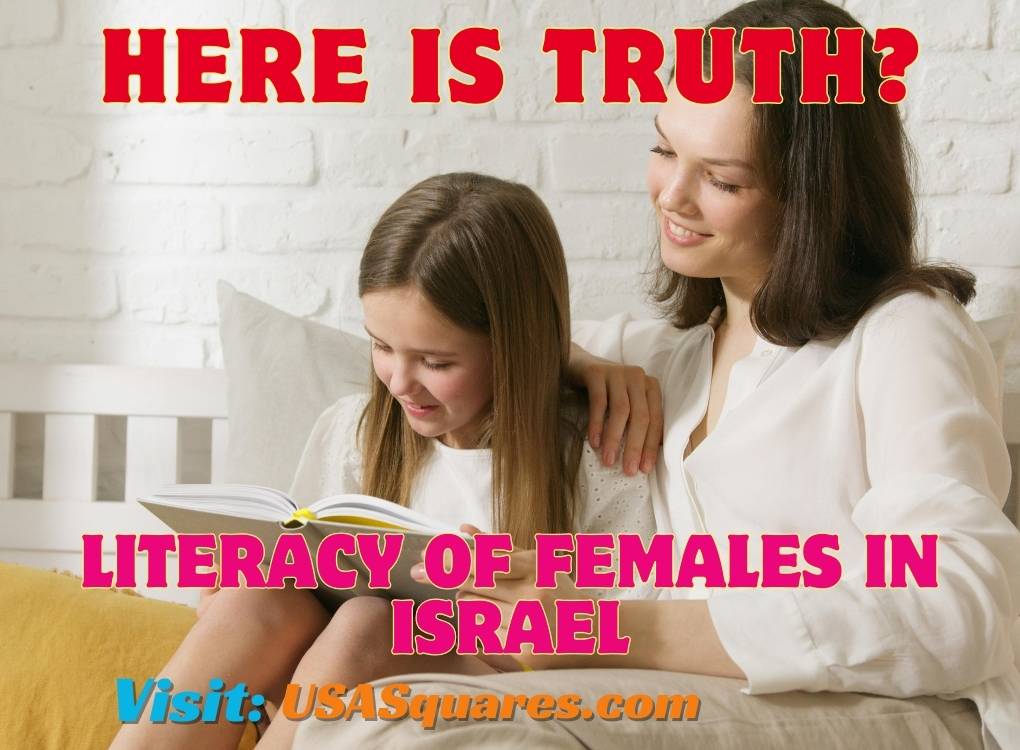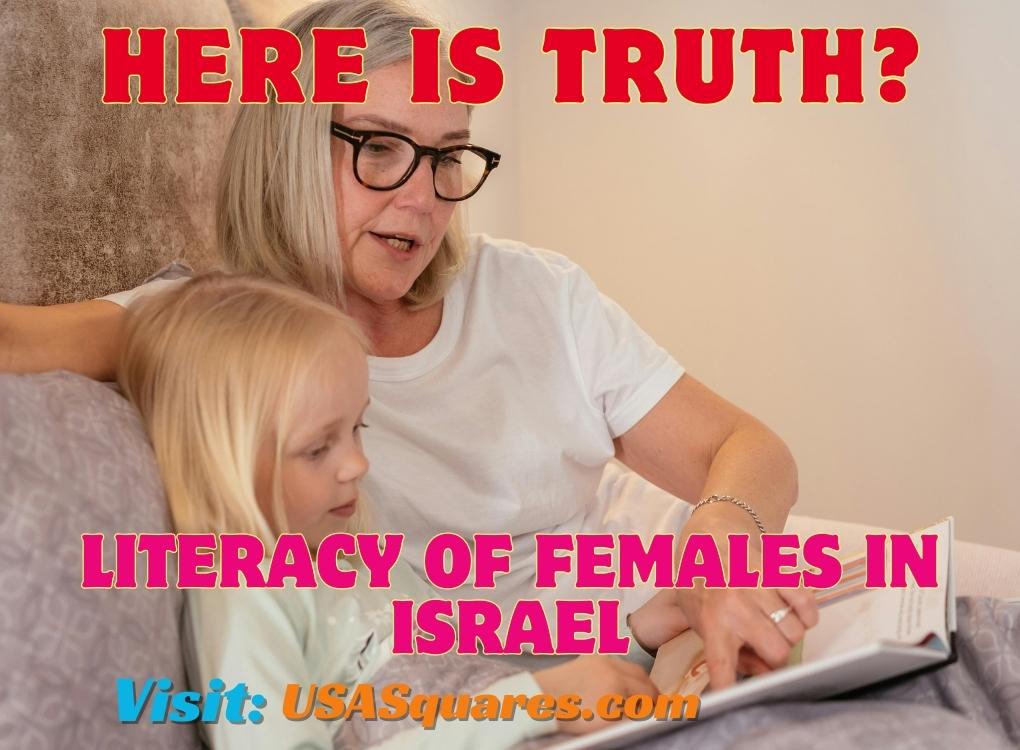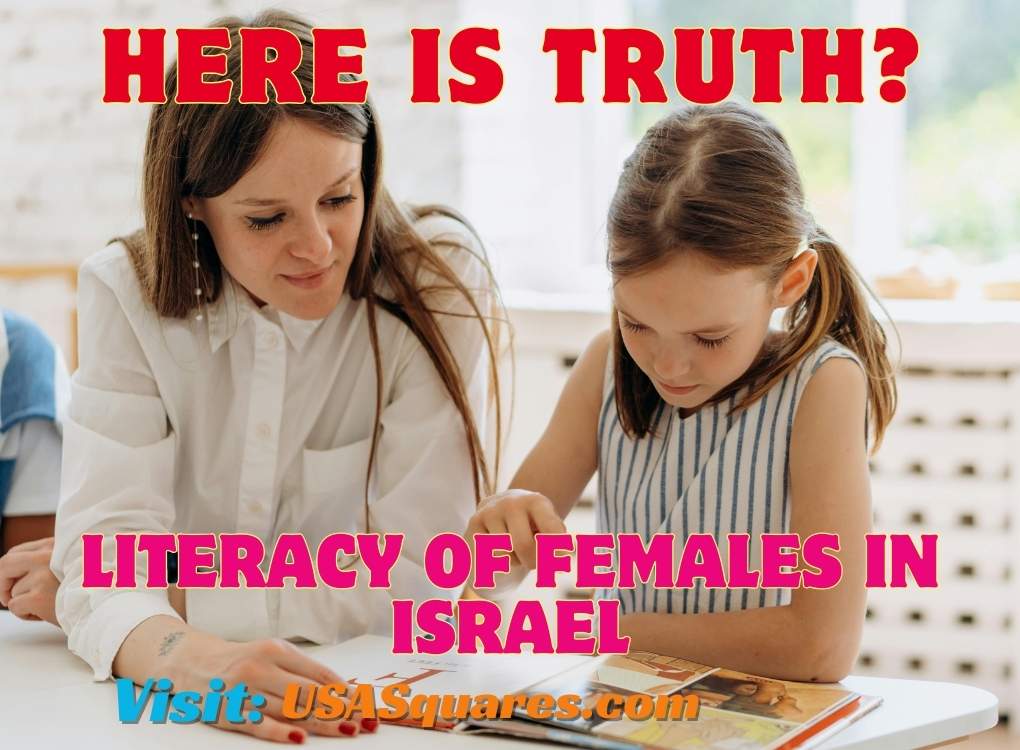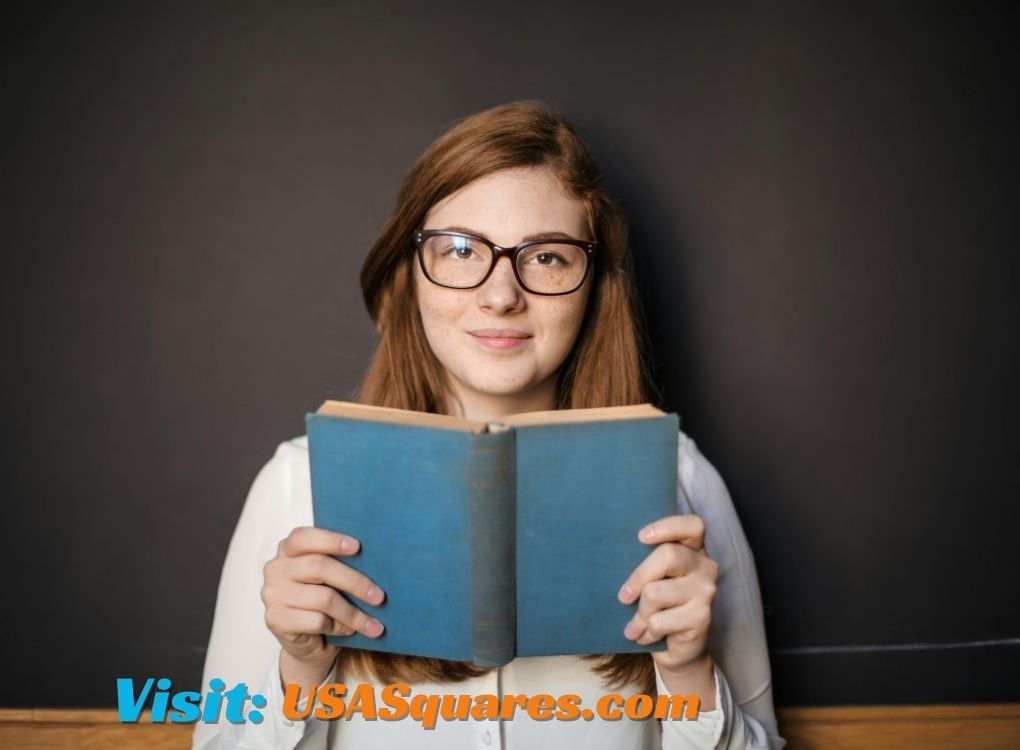
A mother teaching her daughter the joy of reading, highlighting the progress in the literacy of females in Israel.
Literacy of Females in Israel
Introduction
The literacy of females in Israel is a significant indicator of educational progress and gender equality. Literacy, the ability to read, write, and comprehend effectively, is fundamental for personal and societal development. In Israel, the overall literacy rate stands at an impressive 97%, with female literacy rates closely matching those of their male counterparts. This article explores the various dimensions of literacy of females in israel as well as explore related topics such as israels total literacy rate for females, literacy rate total in israel, israel’s total literacy, israel totally literacy, including historical context, current statistics, contributing factors, challenges faced by women, and the broader impact on society.
1. Overview of Literacy rate total in Israel
1.1 Definition of Literacy
Literacy extends beyond the mere ability to read and write; it encompasses critical thinking, comprehension, and the capacity to analyze and apply information in various contexts. Literacy is essential for personal empowerment, informed decision-making, and active participation in civic life. It serves as a foundation for lifelong learning and is vital for economic participation and social integration.
1.2 Israel’s Total Literacy Rate
Recent reports show Israel boasts a total literacy rate of approximately 97%. This high figure indicates the nation’s robust educational system and commitment to ensuring all citizens have access to quality education. The Israeli education system is designed to provide equal opportunities for both boys and girls, resulting in impressive literacy outcomes across the population.
1.3 Historical Context
Since its establishment in 1948, Israel has emphasized education as a fundamental pillar of national development. The state’s founders recognized that a well-educated citizenry was essential for the success and sustainability of the new nation. Early literacy campaigns were launched to ensure that immigrants from various cultural backgrounds could integrate into society and acquire the necessary skills for participation in the workforce and civic life.
1.3.1 Educational Milestones
- 1948-1960s: The state’s early years focused on building an educational infrastructure to accommodate a rapidly growing population. The establishment of schools and vocational training centers was prioritized.
- 1970s-1980s: Implementing the Compulsory Education Law mandated education for children ages 3 to 18, further solidifying the commitment to literacy. This law ensured that all children, regardless of gender, received education.
- 1990s-Present: Recent decades have seen a focus on educational equity, with initiatives aimed at closing the gender gap and ensuring that women have equal access to educational opportunities. Programs targeting underprivileged communities have been introduced to promote literacy among girls.

2. Literacy of Females in Israel
2.1 Current Statistics
The literacy rate for females in Israel is around 97%, which is on par with the literacy rate for males. This remarkable achievement results from concerted efforts by the Israeli government, educational institutions, and civil society organizations to promote female education and literacy.
2.1.1 Comparison with Other Countries
Israel’s female literacy rate is among the highest compared to other countries. Countries with similar literacy rates include:
- Norway: Approximately 99% female literacy
- Canada: Approximately 99% female literacy
- Japan: Approximately 99% female literacy
These comparisons illustrate that Israel’s commitment to female literacy places it in a favorable position globally.
2.2 Factors Contributing to High Literacy Rates
2.2.1 Government Policies
The Israeli government has implemented various policies and initiatives aimed at promoting educational equality, particularly for females:
- Compulsory Education Law: This law mandates education for children ages 3 to 18, ensuring that all girls receive education. The law is strictly enforced, and schools are required to provide quality education to all students.
- Budget Allocation: Significant resources are allocated to education, focusing on developing infrastructure and teacher training. The government invests in schools, libraries, and educational materials to support learning.
- National Programs: Initiatives such as the “National Program for the Advancement of Girls in Education” aim to address specific barriers to female students, including socioeconomic challenges and cultural factors.
2.2.2 Community Support
Community involvement is crucial in promoting female education:
- NGOs and Advocacy Groups: Numerous NGOs work to empower girls and women through education, providing scholarships, mentorship programs, and resources for academic success. These organizations play a vital role in raising awareness about the importance of female literacy.
- Local Initiatives: Many communities have established educational programs targeting girls and encouraging them to pursue academic excellence. These initiatives often include after-school tutoring, workshops, and summer camps.
2.2.3 Cultural Attitudes
Cultural attitudes towards education play a significant role in promoting female literacy:
- Value of Education: In Israeli society, education is highly valued, and families prioritize education for their daughters, recognizing its importance for future success. Many parents encourage their daughters to excel academically and pursue higher education.
- Role Models: Successful women in various fields serve as role models for young girls, inspiring them to pursue their educational goals. Programs featuring female leaders and professionals can motivate girls to envision themselves in similar roles.
2.3 Challenges Faced by Women
Despite the high literacy rates, women in Israel face several challenges that can impact their educational journeys:
2.3.1 Economic Barriers
- Socioeconomic Status: Economic disparities can limit access to higher education for many women, particularly those from low-income families. While literacy rates are high, financial constraints can affect opportunities for further education. Many families may struggle to cover tuition and related expenses.
- Cost of Higher Education: Rising university tuition and related expenses can deter women from pursuing higher education. Scholarships and financial aid programs are crucial to alleviate these financial burdens.
2.3.2 Cultural Norms and Expectations
- Traditional Roles: In some conservative communities, traditional gender roles may limit educational opportunities for women. These cultural norms can discourage girls from pursuing higher education or professional careers despite their literacy capabilities.
- Family Expectations: Some families may prioritize boys’ education over girls’, leading to disparities in educational attainment. In specific communities, girls may be expected to marry early or take on domestic responsibilities, which can hinder their academic aspirations.
2.3.3 Work-Life Balance
- Multiple Responsibilities: Women often juggle various responsibilities, including work and family, making it challenging to find time for education. This issue is particularly relevant for women who aspire to advance their education while raising children.
- Support Systems: Limited support systems for working mothers can hinder their ability to pursue further education and career advancement. Access to childcare and flexible work arrangements can significantly impact women’s educational opportunities.
You may like to explore more interesting article on USA Squares! Top 5 Facts: Do You Know the Literacy of Males in Israel? Unlock the truth behind the numbers and know everything about male literacy in Israel!

3. Educational System in Israel
3.1 Structure of the Education System
The Israeli education system is structured to provide comprehensive education to all children, with a focus on equal access for both genders:
3.1.1 Pre-primary Education
- Age Group: Pre-primary education caters to children aged 3 to 6 and is not mandatory but widely attended. Many families enroll their children in kindergartens to prepare them for primary school.
- Importance of Early Education: Early education is crucial in developing foundational skills and preparing children for primary school. Programs often emphasize socialization, language development, and cognitive skills.
3.1.2 Primary Education
- Compulsory Education: Primary education is mandatory for children ages 6 to 12. The curriculum includes Hebrew, mathematics, science, and social studies. Schools are required to provide quality education to all students, regardless of gender.
- Equal Access: Both sexes receive the same quality of education in primary schools, laying the groundwork for future academic success.
3.1.3 Secondary Education
- Post-primary Options: Students can choose between academic and vocational tracks in secondary education after completing primary education.
- Academic Track: The academic track prepares students for higher education, while the vocational track equips them with practical skills for the workforce. Increasingly, girls are enrolling in both tracks, with a notable increase in those pursuing academic studies.
- Gender Distribution: In recent years, the gender distribution in secondary education has become more balanced, with girls excelling in traditionally male-dominated subjects such as science and mathematics.
3.2 Role of Higher Education
The role of higher education in promoting female literacy is significant:
- University Enrollment: Women represent approximately 60% of university students in Israel, a statistic that underscores the progress made in closing the gender gap in education. This trend reflects a broader societal shift toward valuing women’s education.
- Diverse Fields of Study: Women in Israel pursue degrees in various fields, including science, technology, engineering, mathematics (STEM), humanities, and arts. This diversification of fields is crucial for empowering women in the workforce.
3.2.1 Scholarship Programs
- Financial Support: Various scholarship programs specifically target female students, providing financial assistance and support to encourage their academic pursuits. Governmental and non-governmental organizations often fund these programs.
- Mentorship Opportunities: Mentorship programs connect female students with successful women in their fields, fostering professional development and networking. Such initiatives help build confidence and provide guidance for career advancement.
3.2.2 Women in Leadership
- Leadership Roles: As more women attain higher education, they increasingly take on leadership roles in various sectors, including politics, business, and academia. Women such as former Prime Minister Golda Meir and former President Shimon Peres have paved the way for female leadership in Israeli society. Women’s presence in leadership positions inspires future generations and brings diverse perspectives to decision-making processes.
- Corporate Sector: In the corporate world, women make significant strides as executives and entrepreneurs. Many Israeli companies recognize the value of diversity and are actively working to increase the representation of women in leadership roles. Programs aimed at professional development and leadership training for women are becoming common, further empowering them to ascend to higher organizational positions.
3.3 Innovations in Education
Israel is known for its innovative educational practices, which have a positive impact on female literacy:
- Technology in Education: Integrating technology in the classroom has transformed students’ learning experiences. Digital tools, online resources, and remote learning opportunities have made education more accessible, particularly for women facing barriers to traditional schooling.
- STEM Initiatives: Programs encouraging girls to participate in science, technology, engineering, and mathematics (STEM) fields are gaining traction. Organizations and schools host workshops, coding camps, and competitions for girls to spark interest in these areas. The goal is to increase female representation in STEM careers, which have traditionally been male-dominated.

4. Impact of Literacy on Society
4.1 Economic Benefits
High literacy rates among females lead to substantial economic benefits:
- Workforce Participation: Educated women are more likely to participate in the workforce, contributing to economic growth and national productivity. According to the World Bank, increasing female labor force participation can significantly boost a country’s GDP. In Israel, women’s economic contributions are becoming increasingly recognized, leading to policies supporting workforce advancement.
- Improved Living Standards: Women’s participation in the economy can improve living standards for families and communities, reducing poverty and enhancing quality of life. Educated women are more likely to invest in their children’s education, creating a cycle of empowerment that benefits future generations.
4.2 Social Empowerment
Education empowers women, providing them with the knowledge and skills needed to advocate for their rights:
- Civic Engagement: Literate women are likelier to engage in community activities, vote in elections, and influence local governance. This empowerment fosters a more equitable society where women’s voices are heard and valued. Women’s participation in political processes has increased, with more women running for office and holding leadership positions.
- Advocacy for Gender Equality: Educated women are better equipped to challenge societal norms and advocate for gender equality. They are more likely to participate in initiatives aimed at addressing issues such as domestic violence, workplace discrimination, and reproductive rights. Women’s organizations promote awareness and advocate for policy changes that benefit women and families.
4.3 Global Standing
Israel’s commitment to female literacy places it in a favorable position on the global stage:
- Model for Other Countries: As a nation that values education, Israel serves as a model for other countries seeking to improve literacy rates among women. International organizations often look to Israel’s educational policies and practices as examples of effective strategies for promoting gender equality in education.
- International Recognition: Israel’s efforts to promote female education have garnered international recognition, with various awards and partnerships to share best practices. Collaborating with other nations to promote female literacy and education demonstrates Israel’s leadership.
5. Case Studies and Success Stories
5.1 Successful Female Leaders in Israel
Several prominent women in Israel have made significant contributions to society, demonstrating the positive impact of education and literacy:
- Golda Meir: Serving as Israel’s first and only female Prime Minister from 1969 to 1974, Golda Meir broke barriers in a predominantly male political landscape. Her leadership and determination continue to inspire women in Israel and worldwide.
- Shari Arison: A prominent businesswoman, Shari Arison is known for her philanthropic efforts and leadership in the banking and finance sectors. As one of the wealthiest women in Israel, she advocates for social change and empowerment through education and entrepreneurship.
- Prof. Ada Yonath: A Nobel Prize-winning chemist, Prof. Yonath has made groundbreaking contributions to crystallography. Her achievements in science have inspired countless young women to pursue careers in STEM, demonstrating the importance of female representation in scientific fields.
5.2 Community Initiatives
Various community initiatives have been established to support female literacy and education in Israel:
- Matan – The Jewish Community Center: Matan offers programs to empower women and girls through education and community engagement. Their initiatives include workshops, mentorship programs, and educational resources to enhance literacy and leadership skills.
- Na’amat: This women’s organization focuses on advancing the status of women in Israel through education, employment, and social services. Na’amat provides scholarships, vocational training, and support for working mothers, helping women achieve economic independence.
- Tech Girls: An initiative targeting high school girls, Tech Girls encourages interest in technology and engineering through hands-on workshops and mentorship opportunities. By fostering a love for STEM fields, this program aims to increase the number of women pursuing careers in technology.

Conclusion
In conclusion, the literacy of females in Israel is a testament to the nation’s dedication to education and gender equality. With a total literacy rate of around 97%, Israel stands out as a model for female education in the region. The country has made significant strides in promoting female literacy through government initiatives, community support, and cultural attitudes prioritizing education. While challenges remain, particularly in terms of economic barriers and cultural norms that may limit educational opportunities for women, the commitment to improving the literacy rate total in Israel showcases a positive trajectory toward a more educated and empowered female population. As we look to the future, we must continue supporting initiatives promoting female literacy and education, ensuring all women in Israel can achieve their full potential.
FAQs
1. What is the current israels total literacy rate for females?
The israels total literacy rate for females is approximately 97%, reflecting the nation’s commitment to educational equality.
2. How does Israel’s literacy rate compare to other countries?
Israel’s literacy rate is among the highest globally, showcasing its strong educational system and commitment to ensuring that all citizens can read and write effectively.
3. What challenges do women face regarding literacy in Israel?
Despite high literacy rates, women may encounter economic barriers, cultural norms, and work-life balance challenges that limit access to higher education and career advancement.
4. What steps is the Israeli government taking to improve female literacy?
The Israeli government has implemented various initiatives and policies to promote educational equality, including scholarships for female students and community programs to support girls’ education.
5. Why is female literacy critical for society?
Female literacy is crucial for economic development, social empowerment, and gender equality. Educated women contribute significantly to their communities and the advancement of society as a whole.
6. Are there specific organizations in Israel focused on women’s education?
Yes, organizations such as Na’amat and Matan focus on advancing women’s education and empowerment through various initiatives, including scholarships, vocational training, and community support.
7. How does technology impact female literacy in Israel?
Technology integration in education has improved women’s access to learning resources, enabling them to pursue higher education and professional development, particularly in STEM fields.
Read more captivating content and uncover fascinating insights on USA Squares!




1 thought on “Unveiling the Astonishing Truth: ‘Literacy of Females in Israel’ – Top 10 Facts You Must Know”